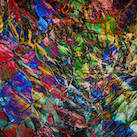

Ben Chatwin: Verdigris
Disinter
Birthed at The Vennel Studio in Fife, Scotland, Ben Chatwin's first release on his new imprint Disinter finds him operating at the peak of his powers. Available in CD, cassette, and digital formats, the thirty-eight-minute recording resists easy stylistic capture, though dark electronica might be the label that comes closest. No one would call Verdigris dance music or techno, yet there are moments on the release that have a rhythmic charge so strong it'd get any club crowd moving, and elements of ambient and dub find their way into the mix too.
Chatwin, who in earlier days issued material under the Talvihorros moniker, is that rare electronic composer to have developed a clearly identifiable identity as a sound artist. The production quality of his material is always exceptionally high, and one comes away from his tracks impressed by his skills as not just a sound designer but composer too. Regardless of the effects and the hardware he uses to create a piece, it always bears his recognizable signature.
One of the things that distinguishes his output is that each piece feels fully and thoughtfully composed. His material unfolds with lucid intent and direction, often builds towards climax and resolution, and moves fluidly between contrasting loud-and-soft episodes. Sound design is as meticulously handled as Chatwin uses modular synths, samples, and other hardware to create his pieces. On this release, for example, medieval choral samples were incorporated, though their presence is often subliminal. Not surprisingly, it's during the hazy dub-techno workout “Chorale” that the voices are most audible, though even here they're blurred.
Emerging from smears of granular textures, “Collapsing in Feedback” asserts the Chatwin identity with full intensity. In this engulfing opening statement, grime-laden bass pulses throb threateningly as sweeping washes of noise expand ominously. An insistent techno pulse powers “Sawtooth” as nightmarish disturbances assume physical form. At the three-minute mark, it becomes easy to visualize a transfixed club crowd heaving in tandem to the swelling groove.
Each of the eight tracks differentiates itself from the others in certain ways. A Boards of Canada-styled aura permeates the otherwise eruptive “Dolmen.” Like some soundtrack to the end of the world, “Pig Iron” layers classical-tinged keyboard patterns over a blistering drum foundation. Rhythmically speaking, “Petroglyphs” takes a slightly funkier direction without lessening the shattering, cut-throat wail of its apocalyptic sound design. Despite sporting a title that sounds like the name of a department out of 1984, the wistful “Ecology of Fear” oozes nostalgia for a world that never was. The most subdued track on the set, the closing “Elegy For All That We Lost” likewise exudes a lamenting, requiem-like tone.
The press release refers to Verdigris as an album of “caustic electronics,” which isn't incorrect (see “Petroglyphs”) but requires clarification. Certainly there's a brutalist dimension to the music, and there's no shortage of grit and grime, but it's never harsh or unpleasant—provocative, yes; painful, no. File Verdigris alongside Chatwin's other releases—those issued under both his birth name and Talvihorros—as well as next to worriedaboutsatan's, his dark electronica kin, you might say.April 2024